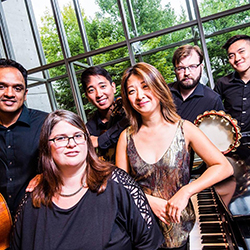by Nicholas Stevens

John Knox Presbyterian Church hosted the group on Friday, May 3, as part of its 2018-19 Performance Series. Director and pianist Shuai Wang served as master of ceremonies in an event devoted exclusively to music for flute, cello, and marimba. The repertoire refuted any stereotypes of recent music as cerebral. On the contrary, thanks in part to the instrumentation, the program imparted a sense of the elemental. Playing pieces devoted to water, air, and land, the musicians achieved a refreshing directness and tactility.
The concert opened with a controlled low rumble from guest marimbist David Luidens. When cellist Daniel Pereira joined, initially free of vibrato but later on leaning into quasi-vocal melodies, he captured the elegiac mood of Golijov’s Mariel. Written to capture the shock of loss, the piece benefited from Pereira’s tight, focused tone and Luidens’s ability to play the same material tranquilly or agitated, depending on the exigencies of the moment.
Within the first note, flutist Madeline Lucas Tolliver gave clear direction to Katherine Hoover’s Kokopeli, her sound expanding as the opening phrase unfurled. The flute can conjure aquatic associations, but here, Tolliver introduced an appealing earthiness into her timbre, reminiscent of the desert terrain that inspired the composition.
Luidens offered contrast with the fifth and sixth movements of Druckman’s Reflections on the Nature of Water, his fine attunement to the marimba’s capabilities emerging in the burbling of “Profound” and the sudden transitions of the slippery “Relentless.”
Tolliver and Pereira joined forces for late-millennial composer Aaron Mencher’s In the Forest, a student work made vital by compelling pizzicato figures in the cello and a series of evocative flutter-tongued tones in the alto flute.
Pereira channeled more forces of nature in movements from Glass’s Songs and Poems for Solo Cello: the vibrant buzz of electricity in the Bach-recalling Song III, and the lapping waves of a warm lake in Song IV. The cold earth of the grave came to mind in Song V, mere steps removed from the gloom of Rachmaninoff, and Pereira’s rendition of Song VII etched traces of humanity into a flinty façade that could have felt lifeless without such a strong interpreter.
Tolliver made sense of the leaps and flutters of Takemitsu’s Air for unaccompanied flute. The trio came together at last for XIX, a new work by John Knox’s director of music and the arts, Geoffrey Petersen. Despite — or perhaps because of — its brevity and clarity of design, Petersen’s sonic play on the number nineteen made for a fitting closer. Comparisons to other composers — Schumann for its fragmentary feel, Reich for its exploration of a predetermined process — lie close at hand. Yet hearing these first-rate musicians make art out of chords expanding in strictly pulsing time felt like a revelation.
Published on ClevelandClassical.com May 7, 2019.
Click here for a printable copy of this article



